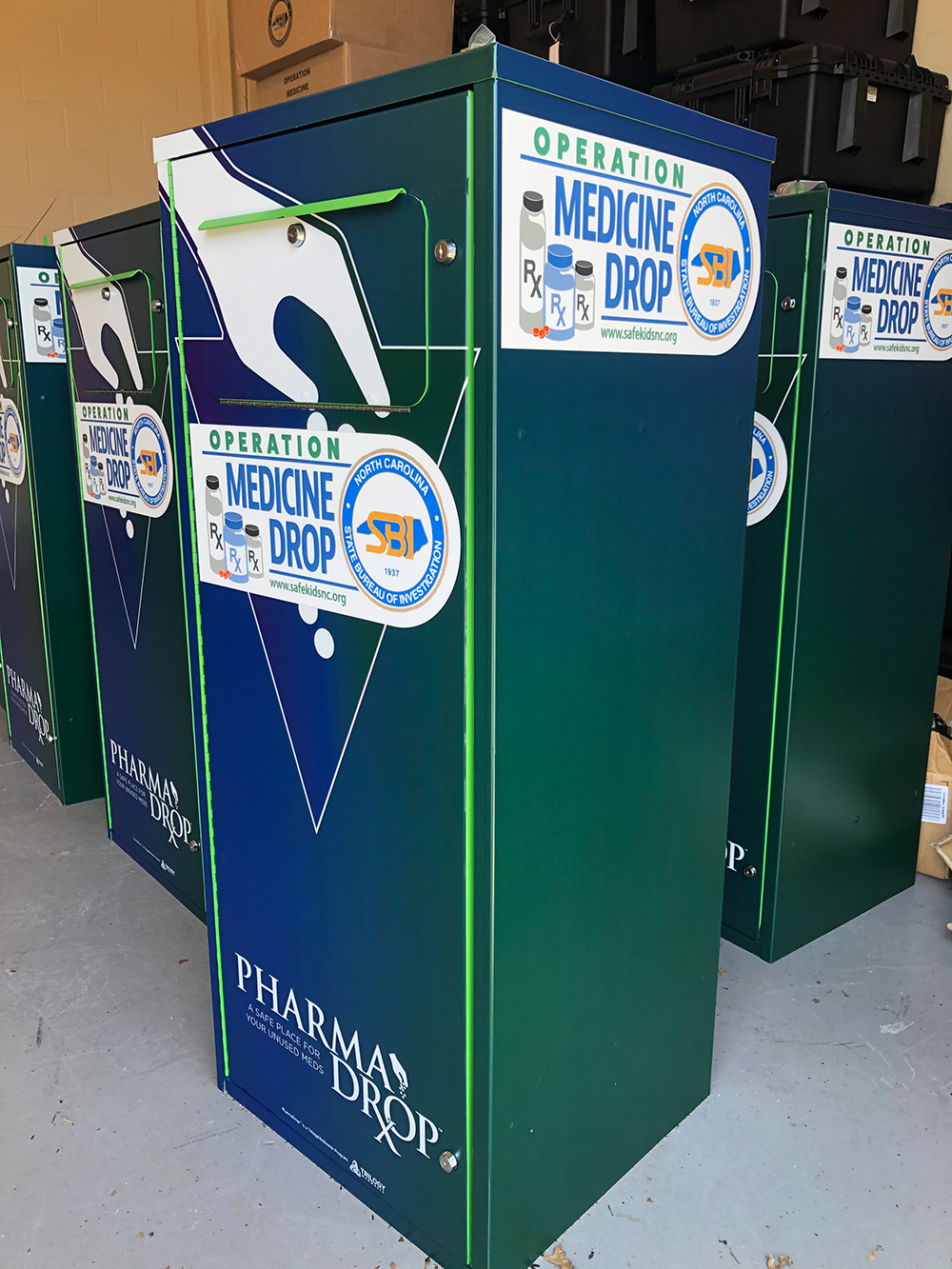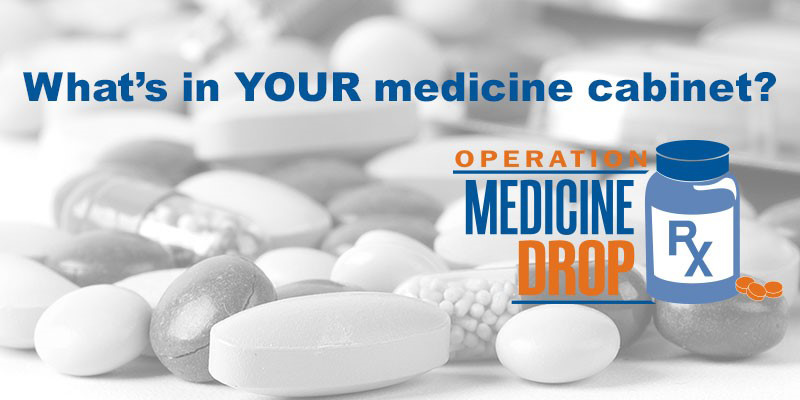Contact Us
To provide feedback on the Community Policing Dispatch, e-mail the editorial board at CPDispatch@usdoj.gov.
To obtain details on COPS Office programs, publications, and resources, contact the COPS Office Response Center at 800-421-6770 or AskCopsRC@usdoj.gov

U.S. Department of Justice
Office of Community Oriented Policing Services
Washington, DC 20530
 The illegal use of prescription drugs and its consequences have been on the decline in North Carolina for the past few years,1 thanks in large part to innovative programs developed by the State Bureau of Investigation (SBI) Diversion and Environmental Crimes Unit (DECU).
The illegal use of prescription drugs and its consequences have been on the decline in North Carolina for the past few years,1 thanks in large part to innovative programs developed by the State Bureau of Investigation (SBI) Diversion and Environmental Crimes Unit (DECU).
One of the most effective programs is Operation Medicine Drop (OMD). According to the unit’s supervisor, Special Agent in Charge John Keane, it is the most successful “take back” prescription drug program in the southeast United States, collecting 68,056 lbs. of prescription and over-the-counter medications in 2019 alone.
Operation Medicine Drop
To encourage safe disposal of prescription medications such as oxycodone, DECU launched Operation Medicine Drop in 2013 by providing secure collection bins with the OMD logo to local law enforcement agencies, which placed them in their lobbies, where the drugs could be easily and anonymously discarded.
Twice a year, on National Take Back Days sponsored by the U.S. Drug Enforcement Administration (DEA), the DECU agents collect the drugs and take them to an Environmental Protection Agency (EPA) approved incinerator, which destroys them without causing any environmental harm. Since it began, OMD has collected and incinerated 207.2 million unused prescription and over-the-counter pills.
A collaborative program developed by the DECU and cosponsored by Safe Kids North Carolina, the DEA, the North Carolina Department of Justice, the North Carolina Department of Insurance, the North Carolina National Guard Counterdrug Task Force, and the office of North Carolina Attorney General Josh Stein, OMD is widely supported. One hundred and thirty-six law enforcement agencies participated in 2019.
Wide-Ranging Drug Investigations
In addition to collecting these medications, most of which were legally acquired, the DECU investigates the illegal diversion of prescription drugs by personnel in hospitals, nursing homes, and other healthcare facilities, as well as their acquisition by individuals who commit prescription fraud.
Drug diversion has multiple sources. It can involve the dilution, substitution, or theft of medication from hospitals, pharmacies, and nursing homes, including inside jobs by medical facility healthcare professionals. The culprits can also be individuals who go “doc shopping” for multiple opioid prescriptions, which they take to different pharmacies to receive multiple prescriptions at the same time.
The DECU conducts investigations of all of these crimes as well as large scale or multijurisdictional prescription fraud cases, and also follows up on suspicious deaths in healthcare facilities.
Drug Diversion Investigator Training for Local Law Enforcement
To expand investigative abilities within the state, the unit has also developed a new training program that empowers local law enforcement with a drug diversion certification and access to North Carolina’s database of prescription drug information.
In addition to teaching officers procedures such as how to work a prescription fraud case or investigate overdose deaths, the Certified Drug Diversion Investigator's class helps them develop valuable professional relationships.
Says Keane, “They get to know the DECU instructors and can call us for advice on complex cases—for instance, a multijurisdictional prescription fraud case in which several suspects are passing prescriptions, using false identities, or paying homeless people to pick up the medication. It can be hard to track down all the players.”
Enabling Access to the State’s Prescription Drug Database
 After completion of the three-day course, the officers receive a state certification and are granted access to the state’s prescription monitoring program, known as the Controlled Substance Reporting System (CSRS) in the state of North Carolina.
After completion of the three-day course, the officers receive a state certification and are granted access to the state’s prescription monitoring program, known as the Controlled Substance Reporting System (CSRS) in the state of North Carolina.
Says Keane, “It’s an innovative, and I think somewhat unique, course. We developed it in 2018, when our state legislature passed the Heroin and Opioid Prevention and Enforcement (HOPE) Act, which allows a certified diversion investigator to obtain electronic prescription records connected to an active and bona fide investigation of licit controlled substances.”
Addressing Privacy and Confidentiality Concerns
“Up until the HOPE Act, only DECU and the DEA Tactical Diversion Squad had law enforcement access,” Keane notes. “This new capability will greatly aid local law enforcement, and help us too, by enabling more efficient and timely investigations of a greater number of cases, which can directly mitigate the overdose death rate in North Carolina.”
However, though it’s a very important tool for the investigation, the database access comes with many confidentiality issues related to HIPAA rules for safeguarding patient medical information. “Initially, there was a lot of concern about giving local law enforcement direct access to the database, which contains patient names, doctors, etc.,” says Keane. “But the state agreed to allow it if our unit would teach the procedures and requirements in a certified training program.”
Supporting Multijurisdictional Investigations
Although the officers who completed the course have access to the database, the DECU has oversight of their CSRS request. “We know what they are querying,” he says. “If it’s a bona fide investigation, we approve the request and provide a copy of the patient’s prescription profile to the officer.”
Says Keane, “It can be hard to run down all the leads in some cases, going to pharmacies and doctors’ offices across the state to get documents. But with access to the CSRS database, local law enforcement can get the information they need from anywhere in the state; and by partnering with us, they also have ability follow up wherever the investigation leads.
“It’s a force multiplier in that local agencies can now handle many of the state’s diversion cases now,” adds Keane. “So far, we have certified 70 detectives throughout the state. And because of confidentiality issues, we also train their supervisors. They have to be able to know if their officers are doing their investigations properly. We must guard against any misuse of the system.”
Seeing Results, Making a Difference
As a result of these programs, there have been numerous drug seizures and arrests, reducing the use of prescription opioids in communities across the state. To help support their continuing success, the COPS Office awarded an Anti-Heroin Task Force (AHTF) grant to the DECU in 2018, funding overtime pay for agents and financial support for the certification training program.
Noting the importance of Operation Medicine Drop in 2019, North Carolina Attorney General Josh Stein described prescription opioids as “like a magnet to people struggling with addiction or young people looking to mess around,” adding that keeping unneeded prescriptions helps fuel the opioid epidemic.
“But there is one thing each one of us can do to make a difference and keep people safe in our communities: safely dispose of unneeded medication and lock up any other prescriptions to ensure they will not get in the wrong hands.”
DECU’s programs are going a long way to reduce the misuse of opioid medications in North Carolina, not just by keeping millions of them out of the wrong hands, but by taking back those that have ended up there despite all precautions.
Faye C. Elkins
Sr. Technical Writer
Further Reading
Prescription Drug Fraud and Misuse, 2nd Edition
References:
1. “North Carolina: Opioid-Involved Deaths and Related Harms,” NIH National Institute on Drug Abuse, last updated April 2020, https://www.drugabuse.gov/opioid-summaries-by-state/north-carolina-opioid-involved-deaths-related-harms.
Subscribe to Email Updates
To sign up for monthly updates or to access your subscriber preferences, please enter your email address in the Subscribe box.






